The 2022-23 Massachusetts Farm to School Institute included teams from Northampton, Salem, Westport Public Schools, and Worcester Head Start. Here are some reflections from the different Institute teams about their experiences and the many initiatives they were able to implement this year!
Northampton – Freshampton
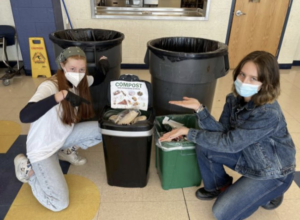 Northampton Public Schools, was excited to continue growing their to farm to school programming. They have an Instagram account (@eatfreshampton) dedicated to celebrating and promoting local food and educating their students about nutrition and food choice. The team started the year off by defining what “local” means to them, both for the purposes of procurement, and in deciding a radius for engaging with community partners and neighboring school gardens. They also are in the beginning stages of piloting a composting program in their district, starting with the high school with plans to expand to their middle and elementary schools as well.
Northampton Public Schools, was excited to continue growing their to farm to school programming. They have an Instagram account (@eatfreshampton) dedicated to celebrating and promoting local food and educating their students about nutrition and food choice. The team started the year off by defining what “local” means to them, both for the purposes of procurement, and in deciding a radius for engaging with community partners and neighboring school gardens. They also are in the beginning stages of piloting a composting program in their district, starting with the high school with plans to expand to their middle and elementary schools as well.
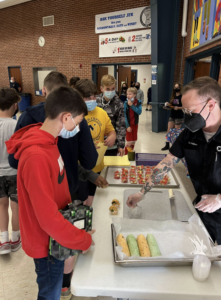 One focus of Northampton’s Freshampton Initiative is to elevate the voice and choice of their students. They frequently hold taste tests in the elementary schools featuring new recipes based on Harvest of the Month ingredients and encourage the kids to vote for their favorites to be added to the school lunch menu. They hosted a logo contest to solicit designs for their Freshampton logo, giving $100 to the winners. Looking towards the future, the Northampton Institute Team hopes to use the money from the MA FRESH grant they recently received to hire a classroom farm to school educator to work in all of their classrooms, organize field trips, and provide an internship program for their high school students!
One focus of Northampton’s Freshampton Initiative is to elevate the voice and choice of their students. They frequently hold taste tests in the elementary schools featuring new recipes based on Harvest of the Month ingredients and encourage the kids to vote for their favorites to be added to the school lunch menu. They hosted a logo contest to solicit designs for their Freshampton logo, giving $100 to the winners. Looking towards the future, the Northampton Institute Team hopes to use the money from the MA FRESH grant they recently received to hire a classroom farm to school educator to work in all of their classrooms, organize field trips, and provide an internship program for their high school students!
Salem
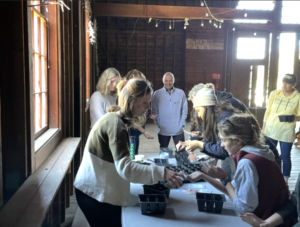 Salem Public Schools developed an action plan that focused on connecting with and strengthening relationships with a number of community partners including Tuft’s Friedman School of Nutrition, Essex North Shore Agricultural Technical School, New Entry Sustainable Farming Project, and Walden Local, to name a few. The institute team at Salem attempts to view all facets of their program through an equity lens. To achieve this goal, they conduct surveys to assess their staff’s ability to take students into the garden, collect student feedback about cafeteria meals and garden planning, and culturally relevant meals in the cafeteria. They also make take home meals for families by using scaled-down versions of bulk cafeteria recipes to serve a family of four.
Salem Public Schools developed an action plan that focused on connecting with and strengthening relationships with a number of community partners including Tuft’s Friedman School of Nutrition, Essex North Shore Agricultural Technical School, New Entry Sustainable Farming Project, and Walden Local, to name a few. The institute team at Salem attempts to view all facets of their program through an equity lens. To achieve this goal, they conduct surveys to assess their staff’s ability to take students into the garden, collect student feedback about cafeteria meals and garden planning, and culturally relevant meals in the cafeteria. They also make take home meals for families by using scaled-down versions of bulk cafeteria recipes to serve a family of four.
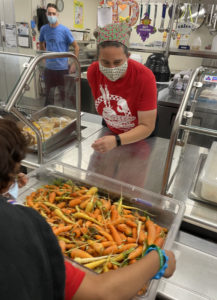 Salem gets a lot of mileage out of their garden, creating uses beyond simply agriculture and science education. The team has made great efforts to establish their garden as a safe space for social-emotional learning, writing, reading, physical education and more. Salem has developed a K-5 Farm to School curriculum incorporating many subjects to use throughout the district. They had a professional development day at the offices of their partner, New Entry Sustainable Farming Project, to highlight their work using a USDA planning grant. They also partner with the University of Massachusetts Amherst Nutrition program to have, “Salad Days,” where an educator teaches the students nutrition lessons based on what they are growing in their garden. Looking forward, the Salem team plans to post a land acknowledgement honoring the Naumkeag tribe that once inhabited the land that the Carlton Innovation School garden sits on, and is searching for more funding, whether through grants or budget allocations from the district, to implement more Farm to School initiatives.
Salem gets a lot of mileage out of their garden, creating uses beyond simply agriculture and science education. The team has made great efforts to establish their garden as a safe space for social-emotional learning, writing, reading, physical education and more. Salem has developed a K-5 Farm to School curriculum incorporating many subjects to use throughout the district. They had a professional development day at the offices of their partner, New Entry Sustainable Farming Project, to highlight their work using a USDA planning grant. They also partner with the University of Massachusetts Amherst Nutrition program to have, “Salad Days,” where an educator teaches the students nutrition lessons based on what they are growing in their garden. Looking forward, the Salem team plans to post a land acknowledgement honoring the Naumkeag tribe that once inhabited the land that the Carlton Innovation School garden sits on, and is searching for more funding, whether through grants or budget allocations from the district, to implement more Farm to School initiatives.
Westport
Westport School District is newer to Farm to School programming, but that did not stop their Institute team from hitting the ground running, particularly in the realm of physical education. The Westport Institute team’s vision is to, “plant knowledge and cultivate community,” and their mission is to, “encourage students, teachers, and families to grow in ecological literacy, health, and sustainability.” In their first year, they have focused on their elementary school with lots of activities happening in the first and second grade classrooms, such as composting, harvesting, and learning about plant life cycles. Westport also hosts weekly taste tests based on Harvest of the Month ingredients. They also asked students to take pictures of themselves trying various fruits and vegetables at home to be displayed on a monitor in the school cafeteria.
Third and fourth graders got to have fun in the outdoor gardens weeding, making compost, and using their math skills to determine the necessary spacing between their kale, lettuce, snap pea, collard green, and garlic plants. The Westport team put together a field day event based on a group activity conducted during the Massachusetts Farm to School Institute Retreat in October.
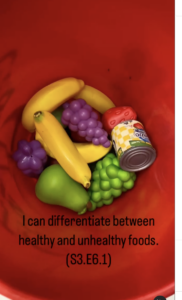 Westport was able to incorporate unique & fun indoor Farm to School activities through their physical education department. As can be seen on their instagram account (@wes_healthwellness) they have done activities such as a Three Sisters Showdown- a team event based on the Native American principle of growing squash, beans, and corn together, and a Cheeseburger Run- teaching the kids about food sourcing by looking at the geographic origins of each component in a cheeseburger! There are a lot of farms in the Westport area, and the Institute team has plans to take field trips to visit cows and show food growing on a larger scale to their students.
Westport was able to incorporate unique & fun indoor Farm to School activities through their physical education department. As can be seen on their instagram account (@wes_healthwellness) they have done activities such as a Three Sisters Showdown- a team event based on the Native American principle of growing squash, beans, and corn together, and a Cheeseburger Run- teaching the kids about food sourcing by looking at the geographic origins of each component in a cheeseburger! There are a lot of farms in the Westport area, and the Institute team has plans to take field trips to visit cows and show food growing on a larger scale to their students.
Worcester Head Start
Worcester Head Start had a successful Institute year, working with their coach, Eliza Lawrence of the Regional Environmental Council to create a well developed farm to school action plan. Their plan included recruiting volunteers, having a professional development farm to school kickoff event, connecting with families, and developing fun nutrition education activities for children.
At the professional development kickoff day they introduced the farm to school mission to all their classroom teachers and recruited farm to school ambassadors for each of their four early care centers. The teachers had the opportunity to practice making recipes using new equipment, and all the equipment and food staples were made available to teachers throughout the year.
Eliza helped Worcester Head Start create a mobile mini-farmers’ market for the children, where they were able to shop, gathering items from their list, and working their way around child-sized tables. At the end of the market they took all the produce home (provided by the Regional Environmental Council) with them.
Looking to the future, Worcester Head Start would like to be able to hire paid farm to school ambassador positions at each center, host a farmers’ market run by children for their parents, and start a hydroponic growing program. They have four centers with six or more Farm to School Ambassadors at each center. They recently had over 25 family, staff, and neighborhood volunteers help build new garden beds at the Greendale center. Read more about their farm to school programs here
Phone: (413) 253-3844
Email: info@massfarmtoschool.org